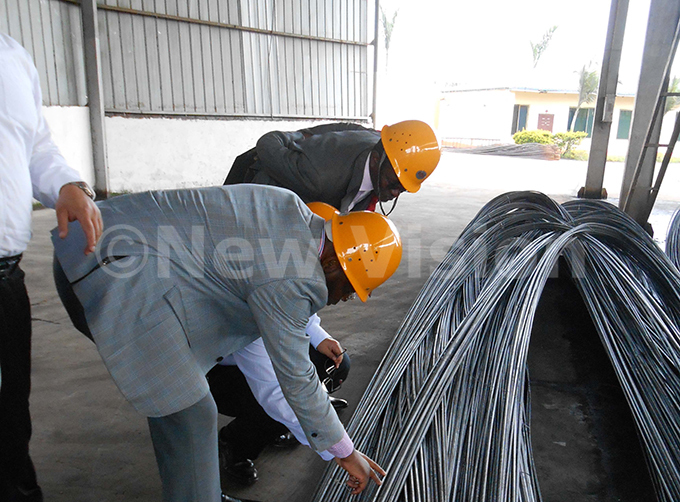UMA in fact-finding mission for the Production capacity of steel Industries
Oct 04, 2016
Recently government directed that that procurement of construction materials for government projects should consider those being manufactured with in the country to at least 40%.

Uganda Manufacturers Association (UMA) has embarked on a fact finding mission to find out if industries manufacturing steel products have the capacity that is needed for the ongoing huge government infrastructure projects.
These include the construction of various dams like Isimba, Karuma, the upcoming Standard Gauge Railway (SGR), Entebbe express highway, Karuma dam among others.
In the mission, UMA wants to get the actual capacity of production, the quality of the products, expansion plans so as to push for members to benefit from the local content pronouncement that was made by the president.
This was revealed by the executive director of the UMA, Sebagala Kigozi, while meeting TianTang steel manufactures in Mbalala recently."The idea is that when that time comes, we shall be in position to take part in the bidding process with facts about figures, samples, quality and combined capacity of production from the 10 steel industries that we have," Sebagala explained.
Recently government directed that that procurement of construction materials for government projects should consider those being manufactured with in the country to at least 40%.
This follows complaints from steel, cement manufacturers that they were being left out in the procurement process of the construction materials for dams, roads and the upcoming standard gauge railway.
To this effect, government directed that all government procurement must consider 40% of products made in Uganda ranging from construction to household consumption, stationary among others.
 Ssebagal looks at the steel bars to make sure they have labled
Ssebagal looks at the steel bars to make sure they have labled
"If you have 20% coming from Tiang Tang and the other percentage from other members being bought by government which is the biggest buyer we all stand to benefit not directly but through our relatives, friends who are in one way or another are employed in these sectors," Ssebagala added.
From Tiang, the next visit will be Roofings, Tembo, Steel and Tube, East African Roofing until all the ten have been visited to take advantage since government is the biggest buyer of all products.
Much as there is the window of benefiting from the 40% local content pronouncement, sector players claim products made in Uganda are of low quality compared to what is needed for their projects.
But the Tiang Tang's legal advisor Ronald Tusingwire explained that all their products have been tested by Uganda National Bureau of Standards (UNBS) and have been approved.
That is why they are already supplying some of their products towards the construction of Isimba power dam, Karuma, and even the Entebbe express highway that is ongoing.
"When other projects start and they give us the specifications they want we shall gladly adjust and provide the quality and quantity needed so issues of poor quality are not true," said Tusinquire.
He was joined by Sebagala who said already there is a committee monitoring the steel which is working with UNBS to monitor all steel products including the marking of iron bars with a company name and millimeters to weed out fake ones.
Currently the group is running four lines of production, including conform mattresses, wood processing from pine, steel among others.
It employs 1200 Ugandans and 20 Chinese. Last year they paid taxes to government worth 4million dollars and this is expected to increase this financial year to 5million dollars with the expansion plan on the wood sector.
Already a total of 125 million dollars has been earmarked for the expansion plan of the wood section which will be producing MDF boards, Ply wood and related wood materials needed in the construction sector.
Some of the challenges facing the company include unstable power supply, competition from low quality mattresses from Kenya and imports of plywood yet this can be produced within the country.
